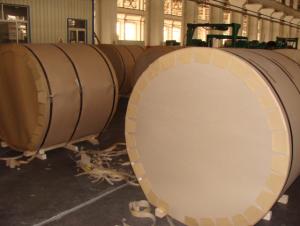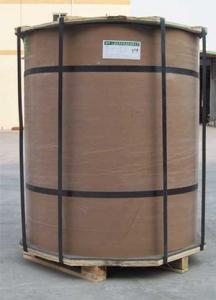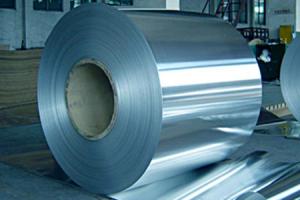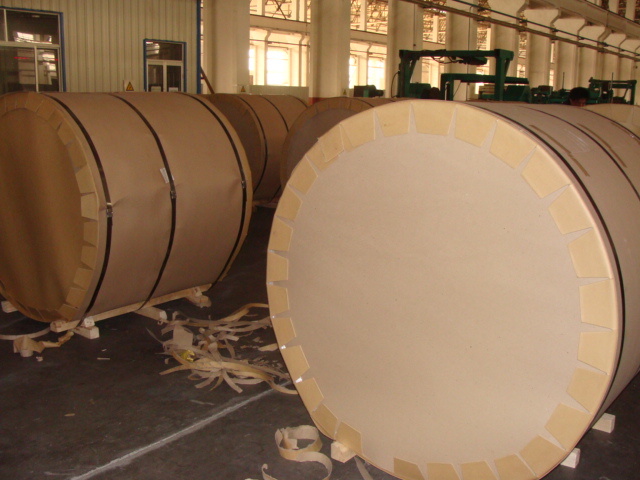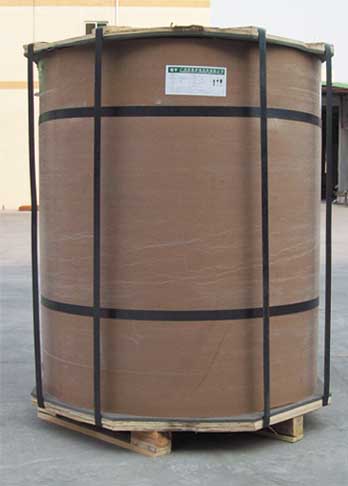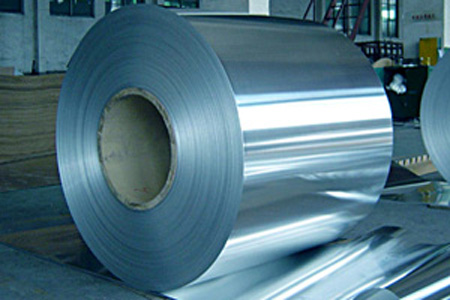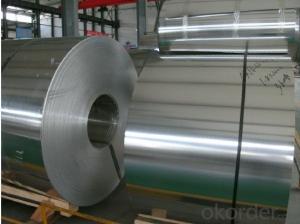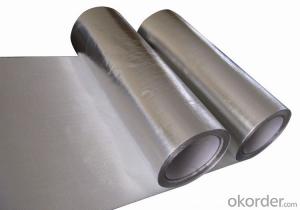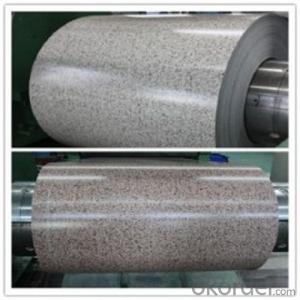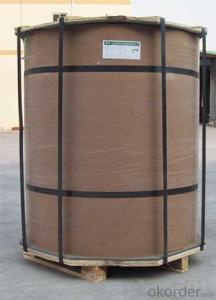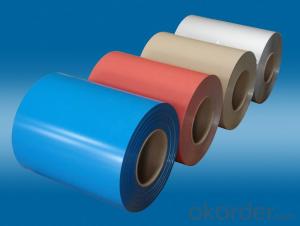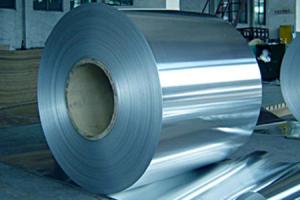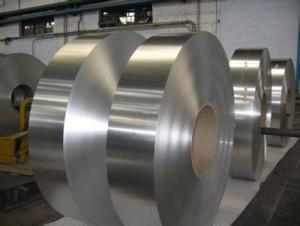3003-H16 Aluminum Coil 0.05 X 102 - Aluminum Strips Mill Finished 5xxx
- Loading Port:
- China Main Port
- Payment Terms:
- TT or LC
- Min Order Qty:
- 8 g/ft
- Supply Capability:
- 10000 g/ft/month
OKorder Service Pledge
OKorder Financial Service
You Might Also Like
1.Structure of Aluminum strips Mill Finished 5XXX Description
Aluminum strips Mill Finished 5XXX has great ductility, heat conductivity, anti-corrosion and moisture resistance properties.
Aluminum strips Mill Finished 5XXX is widely used for electronics, instruments, lighting decoration, packing industry, house decoration, curtain wall, honeycomb-core panel, sandwich panel, aluminum composite panel and aluminum composite pipes.
2.Main Features of theAluminum strips Mill Finished 5XXX
• Superior quality of raw material
• Reasonable and stable chemical composition
• Accurate tolerance
• Goode mechanical property
3.Aluminum strips Mill Finished 5XXX Images
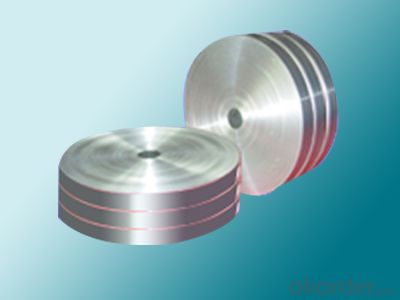
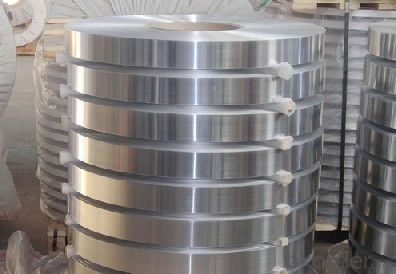
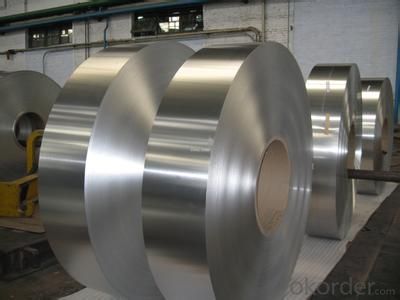
4.Aluminum strips Mill Finished 5XXX Specification
| Alloy | AA5xxx (AA5052,AA5083,AA5754 etc) |
| Temper | H14,H16,H18,H22,H24,H26,H32,O/F |
| Thicness | 0.2mm--100mm |
| Width | 30mm--1700mm |
| Standard | GB/T 3880-2006 |
5. FAQ of Aluminum strips Mill Finished 5XXX
A.How to guarantee the quality?
Customers are welcome to our mill to visit and check the products. Besides, we can arrange a third party to test the Aluminum strips Mill Finished 5XXX products.
B. Now which countries do you export your goods?
Now we export to South East Asia,Africa, North America,South America ect.
- Q: What are the safety measures one should take when using aluminum coils indoors?
- <p>When using aluminum coils indoors, it's crucial to ensure proper ventilation to prevent the buildup of gases that can be harmful if inhaled in large quantities. Always follow the manufacturer's guidelines for installation and operation. Keep the coils away from flammable materials and ensure they are securely fastened to prevent tipping or falling. Regularly inspect the coils for any signs of damage or wear, and replace them if necessary. Never use aluminum coils in enclosed spaces without proper exhaust systems, and always have a fire extinguisher nearby in case of emergencies.</p>
- Q: Can aluminum coils be used in HVAC heat exchangers?
- Yes, aluminum coils can be used in HVAC heat exchangers. Aluminum is a commonly used material in heat exchangers due to its excellent thermal conductivity, lightweight nature, and resistance to corrosion. It allows for efficient heat transfer and is often preferred over other materials like copper in certain HVAC applications.
- Q: what is aircraft grade aluminum?
- Military Grade Aluminum
- Q: This question asks for methods to assess the quality of aluminum coils, which is important for various industries that use aluminum for manufacturing and construction.
- <p>To check the quality of aluminum coils, you should inspect for surface defects such as scratches, dents, or discoloration. Measure the thickness and width to ensure they meet specifications. Test the hardness and tensile strength to verify mechanical properties. Conduct a chemical analysis to confirm the alloy composition. Check for internal defects using non-destructive testing methods like ultrasonic testing. Assess the coil's flatness and straightness to prevent issues in further processing. Finally, ensure proper packaging and storage conditions to maintain coil quality.</p>
- Q: What are the potential health hazards of working with aluminum coils?
- Working with aluminum coils can pose several potential health hazards. One of the primary concerns is exposure to aluminum dust or fumes. When aluminum is cut, shaped, or welded, it can release fine particles or fumes that can be inhaled. Prolonged exposure to aluminum dust can irritate the respiratory system, leading to coughing, wheezing, and shortness of breath. In some cases, it can even cause lung damage or respiratory disorders such as asthma. Another health hazard associated with aluminum coils is the risk of skin contact with aluminum salts or compounds. Aluminum salts can be found in various forms, such as aluminum hydroxide or aluminum chloride. These compounds can cause skin irritation, rashes, and even dermatitis in individuals who are sensitive to them. Furthermore, aluminum coils might be coated with various substances, such as lubricants or coatings, which may contain potentially harmful chemicals. These chemicals can leach into the skin or be released as fumes when the coils are heated or processed. Exposure to these chemicals can lead to skin irritation, allergies, or even more severe health effects if they are toxic or carcinogenic. Moreover, aluminum production and processing involve the use of various chemicals and materials that can pose additional health risks. For instance, during the manufacturing process, aluminum coils may be cleaned or treated with acids, alkalis, or solvents. These chemicals can be hazardous if not handled properly, and workers may be at risk of chemical burns, respiratory irritation, or other acute health effects. To mitigate these health hazards, it is essential to implement adequate safety measures. Employers should provide proper personal protective equipment (PPE), such as respirators, gloves, and protective clothing, to minimize exposure to aluminum dust, fumes, and chemicals. Regular ventilation and air monitoring should also be in place to ensure a safe working environment. Additionally, training programs on safe handling and disposal of aluminum coils and related materials should be provided to all workers to minimize the risk of accidents or injuries.
- Q: This question asks about the duration an aluminum coil can last before it needs to be replaced or becomes unusable.
- <p>The lifespan of an aluminum coil can vary significantly depending on its application, quality of the material, and environmental conditions. Generally, if properly stored and used, aluminum coils can last for several years without significant degradation. However, in industrial settings where coils are subjected to continuous use and harsh conditions, their lifespan might be reduced to a few years or even less. Regular maintenance and inspection can help extend the lifespan of aluminum coils.</p>
- Q: Are aluminum coils suitable for high-temperature applications?
- High-temperature applications are generally not suitable for aluminum coils due to their low melting point of approximately 660 degrees Celsius (1220 degrees Fahrenheit). Aluminum, despite its advantageous properties like lightweight and corrosion resistance, cannot withstand the extreme heat associated with such environments. In contrast, materials with higher melting points like stainless steel or nickel alloys are often preferred for high-temperature settings. These materials can endure higher temperatures without compromising their structural integrity or experiencing significant deformation. However, it is important to note that certain aluminum alloys have been developed to possess improved high-temperature properties. These alloys incorporate elements like copper, magnesium, or zinc, which enhance their strength and heat resistance. As a result, these specialized aluminum alloys may be suitable for specific high-temperature applications that require their unique properties. To summarize, standard aluminum coils may not be appropriate for high-temperature applications, but specialized aluminum alloys are available to offer better performance in elevated temperature environments. It is crucial to consider the specific temperature requirements and consult experts to determine the most suitable material for a particular high-temperature application.
- Q: What is the temperature range within which aluminum coil can be used?
- <p>Aluminum coil can be used within a wide temperature range, typically from -200掳C to 150掳C. At low temperatures, it retains good ductility and strength, while at higher temperatures, it maintains its form and conductivity. However, it's important to note that prolonged exposure to temperatures above 150掳C can lead to a loss of mechanical properties over time. Always refer to specific product data sheets for precise temperature limits.</p>
- Q: How are aluminum coils different from other types of metal coils?
- Aluminum coils are different from other types of metal coils primarily due to their unique properties and characteristics. Unlike other metals, aluminum is lightweight, corrosion-resistant, and highly malleable, making it an ideal material for various applications such as construction, automotive, and electronics. Additionally, aluminum coils have excellent conductivity, enabling efficient heat transfer and electrical conductivity. These qualities, coupled with its affordability and recyclability, set aluminum coils apart from other metal coils in terms of versatility and practicality.
- Q: Is it safe and practical to use aluminum coil in cooking processes?
- <p>Aluminum coil can be used for cooking, but it's important to consider the specific type and context. Aluminum foil, for example, is commonly used for cooking in various forms such as wrapping food for baking or grilling, or lining baking sheets to prevent sticking. However, aluminum cookware is less common due to concerns about aluminum's potential health effects and its reactivity with certain foods. When using aluminum coil for cooking, ensure it's food-grade and avoid using it with acidic or alkaline foods, as this can lead to leaching of aluminum into the food. Always check the manufacturer's guidelines for safe use.</p>
Send your message to us
3003-H16 Aluminum Coil 0.05 X 102 - Aluminum Strips Mill Finished 5xxx
- Loading Port:
- China Main Port
- Payment Terms:
- TT or LC
- Min Order Qty:
- 8 g/ft
- Supply Capability:
- 10000 g/ft/month
OKorder Service Pledge
OKorder Financial Service
Similar products
Hot products
Hot Searches
Related keywords
